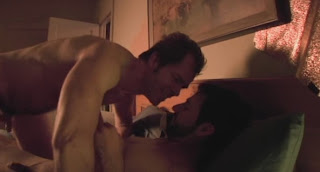Cast: Anthony Hopkins, Jodie Foster, Scott Glenn, Ted Levine
Director: Jonathan Demme
1991
The critically acclaimed film that made Hannibal Lecter a household name. This thriller blended elements of the crime films with horror to become a massive hit, earning over $272 Million and
winning the top five Academy Awards: Best Picture, Best Actor (Anthony Hopkins), Best Actress (Jodie Foster), Best Director (Jonathan Demme) and Best Adapted Screenplay. The film is actually based on the second novel to feature the Hannibal character; the first novel would later be adapted as a prequel film, Red Dragon. Hannibal was actually a secondary villain in this story, but clearly stole the show.
Story: An FBI agent-in-training, Clarice Sterling, gets put on assignment to interview the detained cannibalistic serial killer, Hannibal Lecter, whom the FBI believes has knowledge of a new serial killer, "Buffalo Bill," who skins his female victims and then takes hostage the daughter of a U.S Senator. Instead of giving outright clues, Hannibal teases Clarice with a game of quid pro quo, in which she must tell him personal details of her own life in exchange for clues to nailing Buffalo Bill.
Gay Factors: 1 gay character - Jame Gumb aka "Buffalo Bill." In the film he's portrayed as having been rejected for a sex change operation but is fascinated with the metamorphosis of moths, equating it to his own hopeful evolution to becoming a female. Some articles try to deny the character's homosexuality, stating he wasn't gay but wanted to become a woman. That is contrary to evidence shown in the original novel which states that Hannibal had known and killed Benjamin Raspail, Jame Gumb's former lover.
It became one of the infamous "freak out" moments of film, shocking to hetero audiences, when Buffalo Bill is shown nude with his penis tucked between his legs to appear as a woman. This and the overall depiction of the Bill character left some gay activists to label this film as homophobic.
In addition, the sequel, Hannibal, implies that Hannibal Lecter may be homosexual or at least used it as a tool to become close to certain male victims, although this original film doesn't explore this possibility.
Director: Jonathan Demme
1991
The critically acclaimed film that made Hannibal Lecter a household name. This thriller blended elements of the crime films with horror to become a massive hit, earning over $272 Million and
winning the top five Academy Awards: Best Picture, Best Actor (Anthony Hopkins), Best Actress (Jodie Foster), Best Director (Jonathan Demme) and Best Adapted Screenplay. The film is actually based on the second novel to feature the Hannibal character; the first novel would later be adapted as a prequel film, Red Dragon. Hannibal was actually a secondary villain in this story, but clearly stole the show.
Story: An FBI agent-in-training, Clarice Sterling, gets put on assignment to interview the detained cannibalistic serial killer, Hannibal Lecter, whom the FBI believes has knowledge of a new serial killer, "Buffalo Bill," who skins his female victims and then takes hostage the daughter of a U.S Senator. Instead of giving outright clues, Hannibal teases Clarice with a game of quid pro quo, in which she must tell him personal details of her own life in exchange for clues to nailing Buffalo Bill.
Gay Factors: 1 gay character - Jame Gumb aka "Buffalo Bill." In the film he's portrayed as having been rejected for a sex change operation but is fascinated with the metamorphosis of moths, equating it to his own hopeful evolution to becoming a female. Some articles try to deny the character's homosexuality, stating he wasn't gay but wanted to become a woman. That is contrary to evidence shown in the original novel which states that Hannibal had known and killed Benjamin Raspail, Jame Gumb's former lover.
It became one of the infamous "freak out" moments of film, shocking to hetero audiences, when Buffalo Bill is shown nude with his penis tucked between his legs to appear as a woman. This and the overall depiction of the Bill character left some gay activists to label this film as homophobic.
In addition, the sequel, Hannibal, implies that Hannibal Lecter may be homosexual or at least used it as a tool to become close to certain male victims, although this original film doesn't explore this possibility.
TRAILER




























































